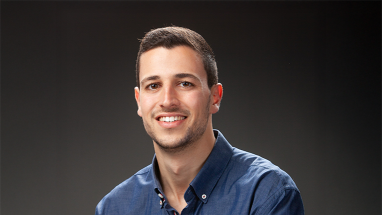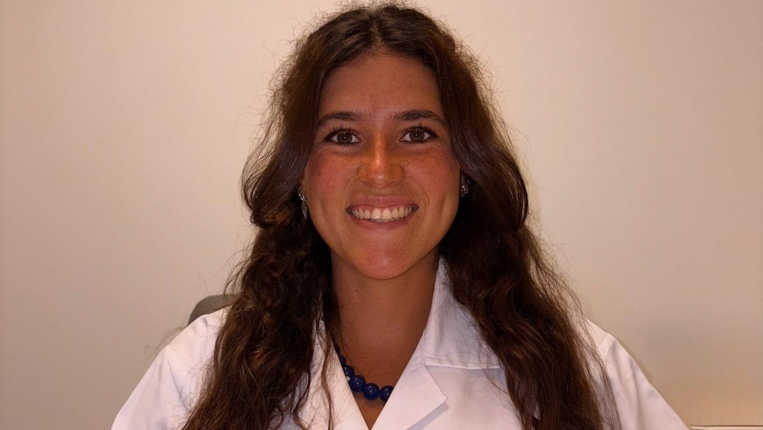
Diogo Resende is 27 years old and holds a bachelor's and master's degree in psychology from the Faculty of Education and Psychology at Universidade Católica in Porto. It was during his undergraduate studies that he discovered a passion for Sports Psychology. He is currently the psychologist for the under-19 team of Sporting Clube de Braga, where his day-to-day life involves close interaction with the athletes. Reflecting on his years at Católica, he highlights the close relationship with professors and the strong practical component of the program. Plans? “To continue feeling fulfilled.”
Why study Psychology?
Studying Psychology came to me almost at the end of high school. I always knew I wanted a career that allowed me to have close contact with people, and for a long time, I thought that would be journalism. I imagined myself out on the streets, talking to people. But in my final year of school, I took a Psychology class and started opening to other possibilities. I became very interested in the topics and realized that this field involves deep relationships and human contact.
When did your interest in Sports Psychology begin?
It was during my undergraduate degree that I began to explore different paths within Psychology. Professor Lurdes Veríssimo guided me and showed me this could be an option. I started researching, talking to people already working in the field, visiting clubs, and reading a lot. My interest kept growing and today, I’m passionate about this area.
What is your daily routine like as the psychologist for Braga’s U19 team?
I work with the team daily, which means I’m with them in the gym, observing individual and group dynamics. I attend all the training sessions and go to physiotherapy with them, and I’m also present in the locker room. There's a very close and constant connection. I provide highly personalized support to each player. A strong bond is built, and that relationship can be meaningful for my work as a psychologist. It's a key factor for a successful intervention.
You’re part of the team…
Exactly. I’m just another team member, present daily with the athletes. Like the coach, the fitness trainer, or the nutritionist, there’s also the psychologist. We are a multidisciplinary team working to help players perform at their best. In my case, beyond offering an open space to talk about anything in their lives, I focus on building self-confidence, training concentration, and helping them cope with mistakes and frustration. Many times, athletes are not performing at their best due to personal or family issues, so my work covers all aspects of their lives.
What are the specific characteristics of the sports context?
Sports share similarities with the corporate world: hierarchy, teamwork, performance, and results. But it also has many unique aspects—like the daily and intense contact I have with the players—that you won’t find in more traditional Clinical Psychology settings.
Is Sports Psychology only for athletes?
It’s for athletes, but not just them. It’s for professionals and amateurs, for anyone who engages in physical activity. But also, for coaches, managers, referees, physiotherapists, and others. Sports Psychology operates in the broader sports context, which includes a wide range of people—and all of them can benefit from a sports psychologist’s support.
What was the biggest mark left during your time at Católica?
The closeness and availability of the professors. I always felt they were genuinely there to help us and dedicated to enriching our experience. The hands-on approach was also crucial, especially during my master’s degree—those two years were truly formative. I learned so much and was shaped into the professional I am today. I had real-world experience and opportunities to deliver interventions and give training sessions. The practical component sets Católica apart. Thanks to this and the internship at FC Porto, I realized that I’m in the right place—Sports Psychology must be part of my life. I identify deeply with this area.
During your master's in educational and human development psychology, you created a series of interviews in Sports Psychology. What was the project about?
The project started with Rúben, a classmate and close friend. We both started in Sports Psychology. We created a YouTube series of interviews with athletes, coaches, referees, and psychologists. It’s called Na Desportiva, and the videos are still available online. The goal was to showcase different perspectives on Sports Psychology by talking to people in the field. We recorded ten interviews, which culminated in a Round Table held at Católica’s auditorium.
Are clubs aware of the importance of having psychologists on their staff?
Generally speaking, there are still some clubs that, for various reasons, don’t have the means to support a psychology team. Some may still be unaware of the potential a sports psychologist brings to a sports organization. However, my experience at Braga was completely different. I work at a club where the psychologist’s role is fully normalized. We have a Psychology Department with 15 psychologists—one for each age group. From a very young age, the kids at the club know what a psychologist is and what they’re for. It’s just as normal to have a psychologist in training as it is to have a coach or physiotherapist. The psychologist is a fully integrated figure.
Plans?
If my future looks like my present day-to-day, I’ll be happy. I plan to keep feeling fulfilled.
Pessoas em Destaque é uma rubrica de entrevistas da Universidade Católica Portuguesa, Centro Regional do Porto.



